Change of position defence /
Saved in:
| Author / Creator: | Bant, Elise. |
|---|---|
| Imprint: | Oxford ; Portland, Or. : Hart Publishing, 2009. |
| Description: | xxviii, 264 p. ; 24 cm. |
| Language: | English |
| Subject: | |
| Format: | Print Book |
| URL for this record: | http://pi.lib.uchicago.edu/1001/cat/bib/7590225 |
Table of Contents:
- 1. Introduction and Overview
- A. Introduction
- B. The Change of Position Defence
- 1. A Core Case
- 2. The Four Main Areas of Doubt
- a. The Reliance Issue
- b. The Fault Issue
- c. The Ambit of Operation Issue
- d. The Rationale Issue
- C. Underlying Assumptions
- 1. Introduction
- 2. The Nature of Unjust Enrichment
- 3. Restitution and Unjust Enrichment
- 4. A Fusionist Approach
- D. Methodology and Overview
- 1. Introduction
- 2. Part One Foundations
- 3. Part Two Definition
- 4. Part Three Ramifications
- Part 1. Foundations
- 2. Lessons from Estoppel by Representation
- A. Introduction
- B. Elements of Estoppel by Representation
- 1. Representation
- 2. Reliance
- a. The Meaning of Reliance
- b. The Role of Reliance as a Causal Requirement
- c. The Applicable Test of Causation
- d. Proving Reliance
- e. A Residual, Evidential Role for the 'But For' Test
- f. The Normative Significance of Reliance
- g. Lessons for the Change of Position Defence
- 3. The 'Reasonableness' Requirement
- a. The Defendant's Reliance must be Reasonable
- b. The Standard of Reasonableness and its Relationship to Good Faith
- c. The Function of the Reasonableness Requirement
- d. Lessons for the Change of Position Defence
- 4. Detriment
- a. The Meaning of Detriment
- b. The Time for Assessing the Detrimental Change of Position
- c. Detrimental Changes of Position include Omissions and Non-pecuniary Changes
- d. The Change of Position must be Irreversible
- e. Lessons for the Change of Position Defence
- C. Bars to the Defence
- 1. Defendant at Fault in Inducing the Representation
- 2. Defendant in Breach of Duty
- 3. Illegality
- D. Conclusion
- 3. Lessons from the Defence of Payment Over by an Agent
- A. Introduction
- B. The Requirement of Payment Over
- C. Notice
- D. Bars to the Defence
- E. Conclusion
- 4. Lessons from Rescission
- A. Introduction
- B. Restitutio in Integrum
- 1. Rescission and the Requirement of Restitutio in Integrum
- 2. The Requirement of Counter-restitution
- a. Rationale
- b. Elements and Operation
- c. Application of the Two Claims Approach to Rescission Cases
- 3. The Defendant's Changes of Position
- a. Change by Exchange
- b. Independent Changes in the Received Benefit
- c. Defendant-instigated Changes of Position
- 4. The Claimant's Changes of Position
- a. Independent Changes in the Received Benefit
- b. Claimant-instigated Changes of Position
- c. An Irreconcilable Tension?
- C. Conclusion
- 1. Rationale
- 2. Elements
- 3. Ambit of Operation
- Part 2. Definition
- 5. Primary Elements
- A. Introduction
- B. Elements
- 1. A Detrimental Change of Position
- a. Detriment as 'Disenrichment'
- b. Detriment as 'Irreversibility'
- c. The Irreversibility Approach is to be Preferred
- d. Proving the Irreversible Change of Position
- 2. Causation
- a. Introduction
- b. But-for Causation in Cases of Independent Changes of Position
- c. Good Faith in Cases of Independent Changes of Position
- d. Reliance in Cases of Defendant-instigated Changes of Position
- e. Reliance must be Reasonable
- f. Anticipatory Changes of Position
- g. Proving Causation
- 3. The Impact of Third Parties
- C. Conclusion
- 6. Fault as a Bar to the Defence
- A. Introduction
- B. Wrongdoers
- C. Duress and Undue Influence
- D. The Innocent Inducer
- E. Illegality and Legal Stultification
- F. Fault in the Defendant's Change of Position
- G. Conclusion
- 7. Ambit of Operation
- A. Introduction
- B. Application to Claims in Unjust Enrichment
- 1. Mistake
- 2. Duress and Undue Influence
- 3. Failure of Consideration
- 4. No Intention to Benefit
- 5. Policy-motivated Unjust Factors
- 6. Cases of Proprietary Restitution
- C. Application to Claims outside Unjust Enrichment
- D. Conclusion
- 8. Rationale
- A. Introduction
- B. Disenrichment
- C. Autonomy
- D. Security of Receipt
- E. A Harm-based Rationale
- F. A Mixed Rationale of Protection and Prophylaxis
- G. Conclusion
- 9. Conclusion
- Part 3. Ramifications
- 10. Ramifications
- A. Introduction
- B. Estoppel by Representation
- C. Payment Over and Ministerial Receipt
- D. Restitutio in Integrum
- E. Good Consideration
- F. Bona Fide Purchase
- G. Statutory Change of Position Defences
- H. Conclusion

